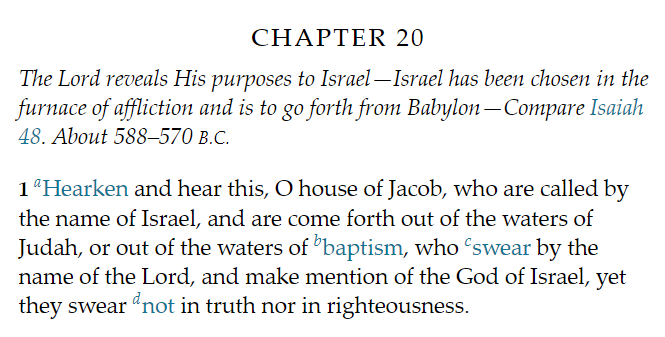
The PostBarthian: Ecumenical Reformed musings of @WyattHoutz. I am a theologian of hope. Member of the Karl Barth Society of North America.
How to get URL link on X (Twitter) App

https://twitter.com/postbarthian/status/1633263204263694337For example, I am not criticizing Paul or dismissing him based on his decision to leave his wife (it does appear to be mutual too). If I am correct, this does not change anything Paul has done or written. It only criticizes people who ostracize Christians with broken marriages

 Notice the textual similarities between 1 Nephi 20:1 [ churchofjesuschrist.org/study/scriptur… ] and Isaiah 48:1 in the KJV [ biblegateway.com/passage/?searc… ]
Notice the textual similarities between 1 Nephi 20:1 [ churchofjesuschrist.org/study/scriptur… ] and Isaiah 48:1 in the KJV [ biblegateway.com/passage/?searc… ]

 Joseph Smith is believed to have found the Liahona (with the gold plates) that is like a magic 8-ball with changing words that includes a compass that works if you don't grumble. As I read #TheBookOfMormon I find gold nuggets every time I google an oddity mentioned in it.
Joseph Smith is believed to have found the Liahona (with the gold plates) that is like a magic 8-ball with changing words that includes a compass that works if you don't grumble. As I read #TheBookOfMormon I find gold nuggets every time I google an oddity mentioned in it. 

 #LawAndOrder was a theme of the #PresidentialDebate2020 last night that highlighted the brutality of police and the call for change.
#LawAndOrder was a theme of the #PresidentialDebate2020 last night that highlighted the brutality of police and the call for change.
https://twitter.com/beingjasonelam/status/1271944106168778752Where was god in the lynching of #GeorgeFlyod? Moltmann would answer, that Jesus was there suffering with George Flyod, calling out "I can't breathe" and "mom, I"m scared" with him.

 James H. Cone studied Karl Barth and did his doctoral dissertation on Karl Barth's theology. Cone went on to develop Black Liberation Theology.
James H. Cone studied Karl Barth and did his doctoral dissertation on Karl Barth's theology. Cone went on to develop Black Liberation Theology.